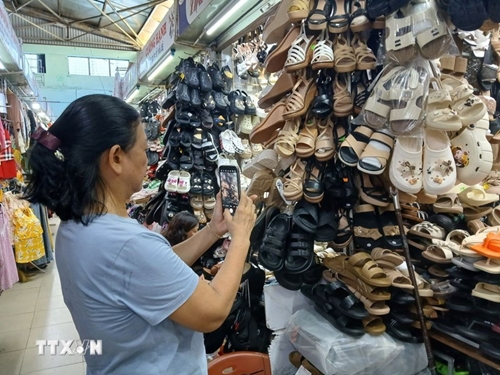To bring traditional markets into the e-commerce ecosystem, the municipal Department of Industry and Trade and the Vietnam E-commerce Association have organized training sessions for more than 100 vendors at major markets such as Con, Han, Dong Da, and Hoa Cuong wholesale market. The courses equipped participants with modern sales skills, cashless payment solutions, and practical guidance on livestreaming via TikTok and Facebook, as well as creating short videos to promote products.
    |
 |
|
Traders at Dong Da market in Da Nang city use Zalo to sell online. |
A survey by the Vietnam E-commerce Association showed that sales at traditional markets have dropped by over 40%, particularly in apparel, fashion, and dried food. Digital transformation is therefore considered crucial to boost revenues.
Vo Van Khanh, the association’s representative in the central region, said small traders need the most support in adapting to modern sales methods. The association has been working with local agencies to assess demand and provide training to help market vendors embrace digital platforms.
Some vendors have already benefited. Nguyen Thi Minh Hieu, who sells bedding at Dong Da market, said livestreaming on Facebook has helped her improve sales and attract new customers. Similarly, Nguyen Phan Anh Phung, a trader at Con market, livestreams via Facebook using just a mobile phone and internet connection. She noted that more shoppers now prefer online purchases for convenience and promotions, making digital sales essential for survival.
To support traders, the Da Nang Market Management and Development Company has launched the “Cho Da Nang” (Da Nang Market) sales group on Facebook, allowing vendors to showcase their stalls and signature products online. The city is also promoting markets as tourist attractions while encouraging e-commerce adoption.
Developing e-commerce associated with cashless payments
The city’s e-commerce platform, danangtrade.com.vn, continues to grow, with nearly 1,950 businesses and 2,738 products and services registered. Meanwhile, cashless payment models under the “Market 4.0” initiative are expanding. Over 15,000 traders at local markets have been equipped with QR codes for online transactions.
Nguyen Van Ha, deputy head of the Lien Chieu market management board, said around 90% of traders at the market now use QR codes for payment, supported by free Wi-Fi and training on livestreaming tied to market etiquette.
However, technology adoption remains a major challenge for many vendors. To address this, the Department of Industry and Trade has organized more than 30 training courses on digital sales solutions with the participation of state agencies, digital platforms, and e-commerce operators.
According to the department’s Deputy Director Huynh Xuan Son, Da Nang, as the economic hub of the central and Central Highlands regions, is accelerating digital transformation to align with new consumption trends, optimize distribution, and better connect producers, sellers, and consumers, especially as the city expands its administrative boundaries with a projected population of over 3 million.
Nguyen Lam Thanh, a representative of TikTok Vietnam, said the platform is cooperating with localities to help small traders access online sales. The program focuses on raising awareness and offering intensive training in digital advertising and e-commerce skills, ensuring that small businesses and Vietnamese brands can build sustainable operations in the fast-growing digital economy.
Source: VNA